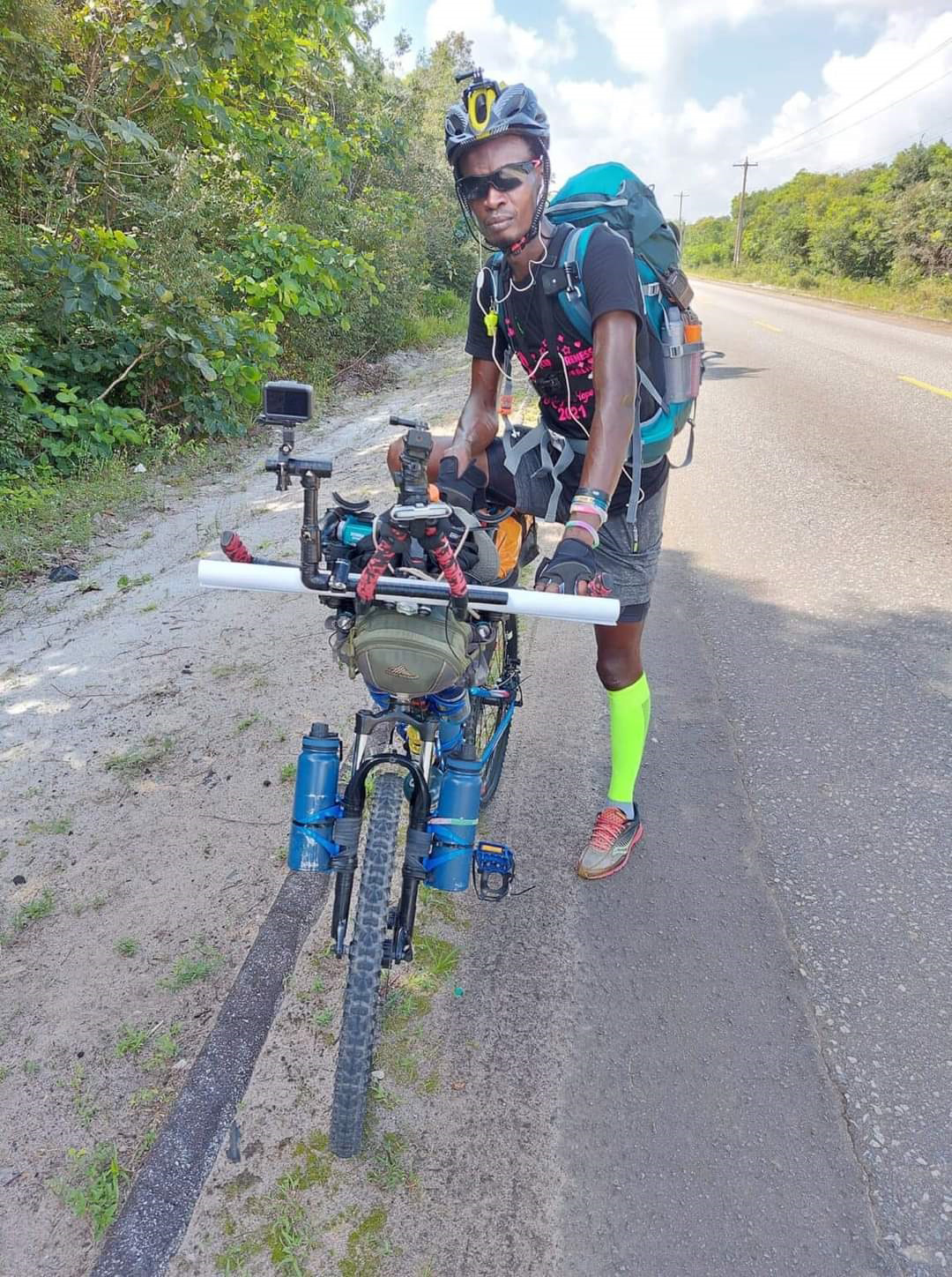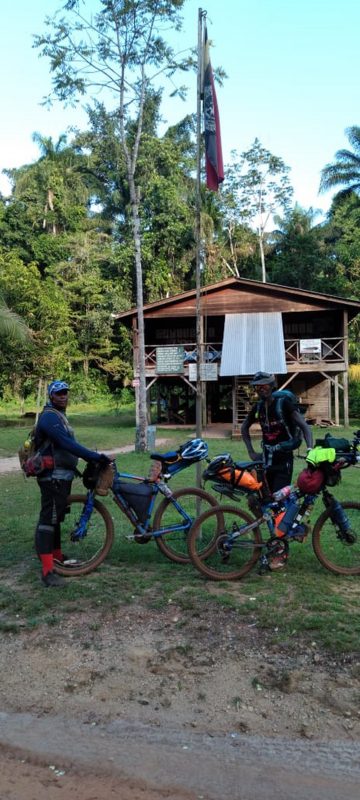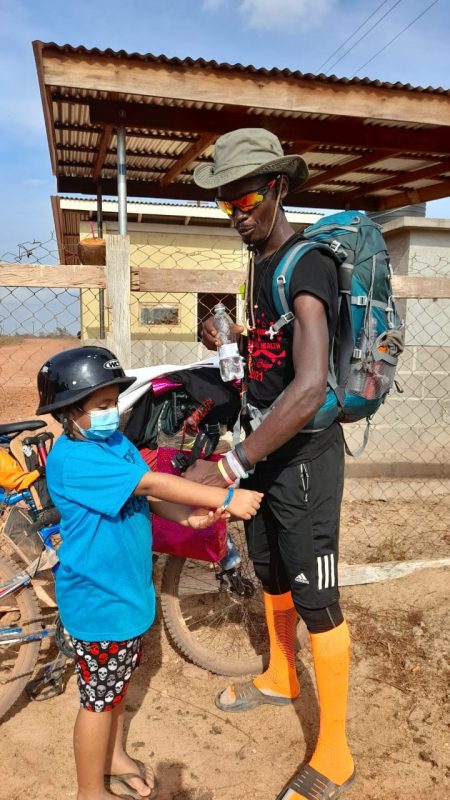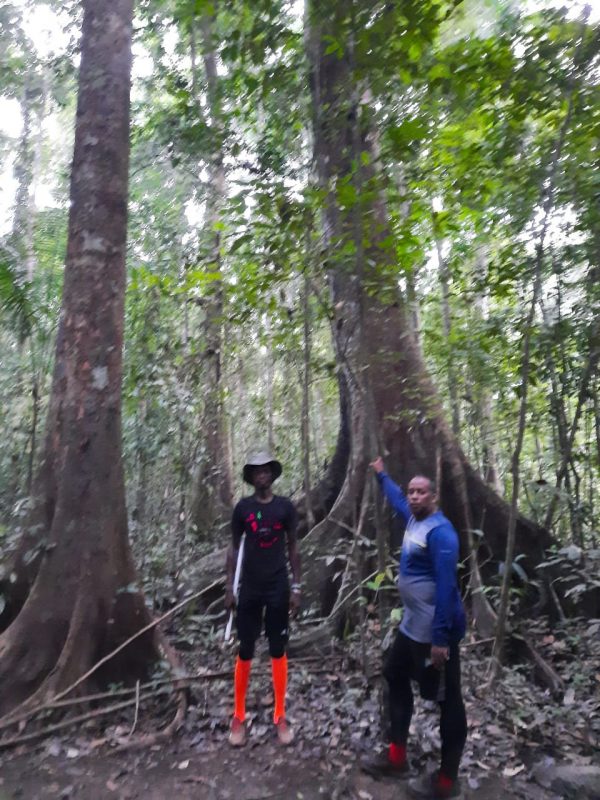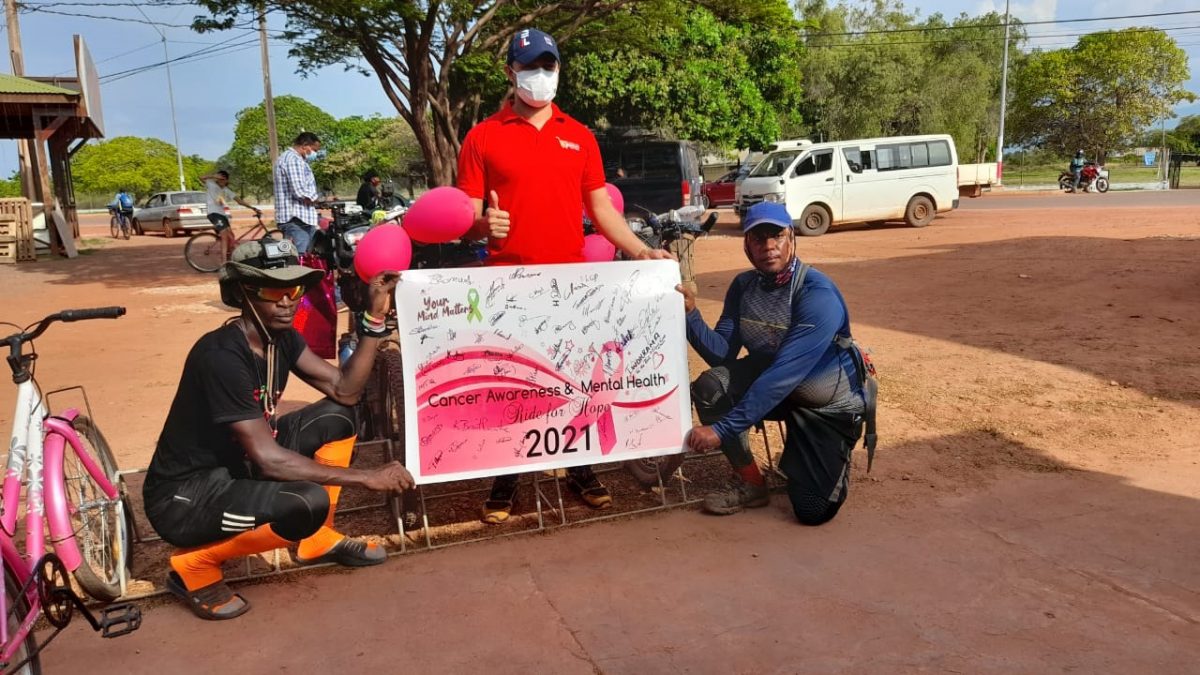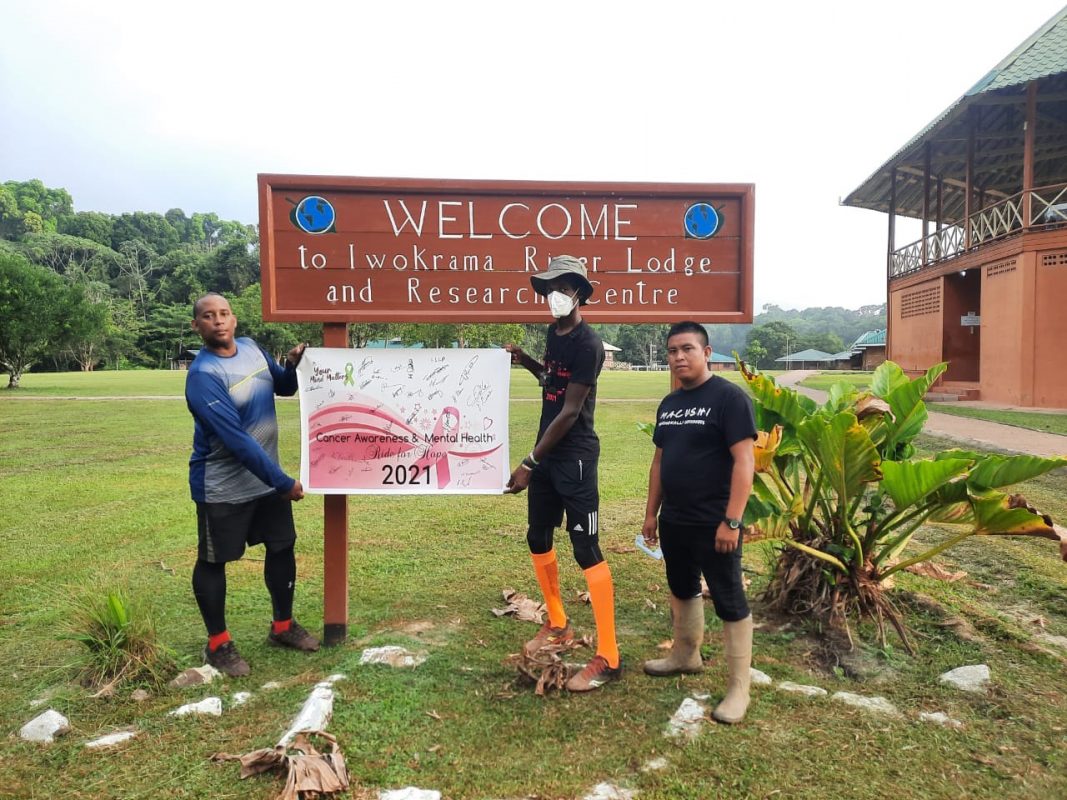When Tyson English, a former schoolteacher, got on his bicycle on the morning of October 29, his mission was to put his physical, mental, and emotional well-being under tremendous pressure to bring awareness to mental health and cancer. Hours into the journey, he was joined by Michael Trotman and together they rode through trails, swamps, savannahs and hills, day and night, stretching themselves thin to complete the mission.
They completed 500-plus miles during that journey, even as they sustained themselves in terms of security, health, diet and also maintained their bicycles. The men also stopped at every community, truck stop and stall on the trail to bring awareness to cancer prevention and mental health, which was their mission.
After two and a half days of riding, with some rests in between, the two arrived in Lethem on the afternoon of November 2, and were surprised to find a welcoming party. The two men believe that willfully putting their bodies under such pressure has given them a better understanding of what people who suffer from mental health and cancer endure.
They also believe they have brought some much needed attention, especially to mental health, as their journey gained much traction on social media and they received tremendous support from random people.
So passionate is English about the issues, especially in light of the support received, that he now wants it to become an annual event, so that people who are in need of physical and emotional assistance are able to receive same.
“I don’t want it to be deemed as a business but it must become a movement, so annually you know that on the 29th of October to the 4th of November you have the Ride for Hope movement or Ride for Hope challenge that is going to be focused on breast cancer or cancer awareness and mental health,” he told Stabroek Weekend, hours after he completed the ride last Tuesday.
Other social issues that can be tied into the initiative will also be included, as shorter versions of the ride will be explored in other regions at different times of the year, so that more people can have the experience and promote eco-tourism at the same time.
Death of an aunt
English said initially the cross-country trip from Georgetown to Linden was planned by him and Trotman for December and it was for personal gain. They had done trips before to different regions on weekends, however, because of clashes of availability, the date was not finalized.
It was during the planning that English lost an aunt to cancer and this triggered him to become more actively involved in spreading the awareness of cancer. He also decided to focus on mental health, as he believes Guyanese do not take this seriously.
“So, I decided instead of doing this for my personal gains, I am going to do it as a movement. In that way, I am going to get other persons to come on board and other persons to brand it and make it a signature event which can be done annually during this period,” the former physical education and art teacher said.
A flyer was created which he posted on his Facebook page and while the response was not favour-able, English said he got some support from friends and vowed that whether or not he got enough support the trip would happen; even if he had to finance it himself.
It was supposed to be him doing a solo ride from Georgetown through the jungle and the savan-nahs to Lethem during which he had planned to shoot some short videos to post on his Facebook page.
He started the journey in Georgetown at 5 am on October 29. He said he did this because he wanted more people to see him off and he knew if he had left earlier fewer people would have been on the road. This meant he was exposing himself to the heat of the sun as he pedalled along the Linden Highway, but “that was a sacrifice I made on my behalf just to get a little support,” he said.
He had almost completed the ride on the highway when well-known sports journalist Rawle Toney, who was passing in a vehicle, stopped and spoke with him and took a photograph which he later posted on Facebook, highlighting English’s journey and its cause.
That post got some traction, and English said when he checked Facebook after completing the first leg, because of the responses, he felt, “this thing is really happening for real”.
It was at this point that Trotman joined him on the journey.
Most extreme
For the duo, it was not just about riding and completing the journey, they strategized to put themselves under the most extreme conditions of fatigue and stress, physically and mentally so that they could “have a good idea of what persons who are suffering from mental illness and persons who are recovering from cancer are going through. So it would have given us a better understanding of how we should go about bringing the awareness, as we did not want to do it just for the sake of doing it,” English shared.
They decided to ride one hundred miles per day, which required them to not sleep but ride both day and night and they programmed themselves to have one hour’s rest.
“Rest in that you relax, close your eyes for one hour and then the alarm pops up and you up again…,” he explained.
Because the initiative was on social media, they were stopped along the way and given encouragement by random people, some of whom took photographs with them. They were offered meals and water and even financial support to purchase needed items.
The first leg, which started on a Friday morning in Georgetown, was completed as planned, ending that same Friday night at 58 Miles village. There, the truck drivers were expecting them and they were offered meals and accommodation.
The second leg started on Saturday morning and continued into Sunday night.
“That was more or less the most challenging aspect because we did not expect to be climbing in excess of 41 hills day and night and part of the trail there was slush and then there were holes and that or stuff. So the challenge for every single leg… posed a different challenge, mentally, physically and of course our bikes for any minor maintenance and of course we had to be our own security and prepare meals…,” English said.
The two had to remain focused and English said they had some hiccups in terms of the trail as his calculation in terms of time was off and they found that they had to make up to get the needed mileage.
“We were moving slow, but steady,” English said.
They managed to get to the Kurupukari River Crossing and it was there that a request was made for them to spend the night at the Iwokrama River Lodge where they also met and had conversation with British High Commissioner Jane Miller.
Initially, they had set six days aside to complete the ride, but in his head English said he wanted to do it in three and a half days or four days at the most. As such, they minimised on solid foods and maximised on liquids. They also planned to ride more of the mileage during the night as it was cooler.
During the journey, English said, they received phone credit and some supporters also sent money to the post office or the bank which they could access in Lethem.
“We had a whole lot of support, not only from sponsors financially, but moral support, words of encouragement and that is what was pushing us even more,” English said.
The most challenging
English shared that surprisingly the savannah was the most challenging part of the journey because of the sun and the hills they had to cross and dehydration stepped in.
“I was without water for about three and a half into four hours, and so I had to now readjust programming how I would move, how I would control my body breathing… Then Mikey started to experience medical hiccups in terms of cramps, circulation problems and so on because we had been riding for so long,” English added.
Because of this the time to complete the final leg began to get longer as their bodies grew more tired and they lost some focus and had to rest more.
They moved from doing 20 to 25 miles in five hours to just one mile per hour and made a decision to stop and sleep in the savannahs.
“And so there we were, threw ourselves down in the savannahs at some random spot and we had a one hour nap, we got up and then we continued,” he said, adding that it seemed as if Lethem was moving further and further away.
But it was the random people who stopped and spoke to them that gave the two riders the encouragement to continue on the journey. As English pointed out, no one forced them to take the journey. As opposed to those who experience mental illness and being afflicted by cancer they had a choice.
“We chose to put ourselves in such a condition to have a better understanding of how people deal with stress and fatigue and so on…,” he noted.
The climatic conditions took a toll on the two riders, but then English said, “miraculously some guys passed and offered us water and that gave us an additional push”. They eventually made it to where the Lethem township begins thinking they would get some water from the creeks but every creek was dry.
Entourage
As the two men rode into the township they were surprised by a waiting entourage, who formed a ceremonial procession to welcome and thank them for the journey they made.
“We were given accommodation, every single thing…” English said.
He said they monitored the journey in terms of the time they spent riding and they took two and a half days to complete the journey from Georgetown to Lethem.
The experience has taught English that having an understanding of your capability is important and once you set your mind on a mission keep to it regardless of what others say.
“From not having adequate amounts of sleep or rest, depriving yourself of solid meals, you know your mind would be playing tricks on you and you have to have some amount of control over what takes place and remaining focused is the other part of the game,” English continued.
He pointed out that people with mental illness fail to have that control and may allow others to determine how they react, but in their case they adjusted and readjusted as the terrain changed.
“You had to be mentally tough to adapt and you had to be mentally focused to understand that okay with this adaptation you can have positives and negatives and be able to outweigh the negatives to move forward,” he said.
English said that having been a teacher for some 18 years, he has seen students exposed to unnecessary stress and fatigue and the toll it took on them. Some were pressured by parents and teachers to do things they were not comfortable with.
He also has friends who suffered from anxiety and have attempted suicide; one friend actually killed himself about 20 years ago.
“So the experiences, they vary for me…,” said English, who has also spent many years as an adult counsellor with the Ministry of Culture, Youth and Sports President’s Youth Award Republic of Guyana programme. During this time, he met youth people from depressed homes and communities and some who were abused.
All of those experiences triggered English’s road trip and will remain the motivation for it to become an annual affair.

